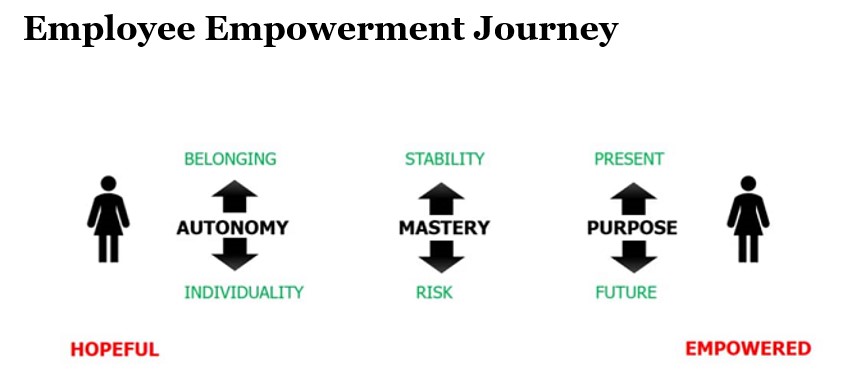You’re Leaving? Let’s Party!
Almost exactly a year ago, we ran two of our most loved episodes on “How to Empower Your Team to Step Up” – and you can watch Part One and Part Two.
I made a key point in that series about empowering your team members by helping them with their careers – even if that meant sometimes giving them the skills to advance their lives by working somewhere else.
This is a scary idea for business owners. None of us want to lose our best employees – it’s the fear that most keeps us awake at night. So I’ll be honest – if your team member has ambitions that you can’t fulfill (working overseas is an obvious example), then they will either leave anyway or stay only because you have crushed their soul.
And since you’re not that kind of a leader, you want to help your team achieve their dreams. Selfishly, maybe you also know that in doing that you will create greater outcomes for yourself as well – often when they decide to stay and fulfil their ambitions by your side.
This week’s episode, now viewable here, is a must-watch for every leader who wants an engaged team.

Blackboard Fridays Episode #70 – A Career Progression Plan for your Best Employees
Back in Episodes 21 and 22, I introduced on Blackboard Fridays the system of the Employee Empowerment Journey.
How critical it is as a business owner that you empower each and every one of your team members? Did you take them from the Hope they have when they join your business to the Empowerment that they need to actually do the best possible job to deliver an outcome for your business and for them themselves?
I quoted Richard Branson who said you need to “Create a team so talented that they could work anywhere, and then create a Culture so good that they wouldn’t want to work anywhere else”. You can see here the connections to the work of Dan Pink and Tony Robbins, and this model of employee empowerment would form the basis of my contribution to the book Visionary Male Leaders.
When I went through the different elements of that employee journey, one of the last ones I talked about was the importance of supporting the career progression of your team members.
Today, I’m going to walk through how you as a business owner need to do that.
How to Support Your Employee Career Progression
Fundamentally, to achieve this level of success, you need to believe and behave from a place of abundance. From knowing that, for some of your best team members their best life is going to mean at some point they stop working for you. And that that is actually an achievement not something to be mourned.
So, how do we help our employees with their career progression? Number one, we need to have an idea of their Personal Career Vision. What is it that they want to be building in terms of their skills or maybe, their salary?
This may mean different roles that they want to perform, different client types they want to work with, maybe even different areas of the world that they want to work within.
Some team members really have no idea what they’re wanting to create and that’s okay. Keep having the conversation.
This is where things like mentors and coaches for your team members can be valuable, whether internal or external. They help your individual team members get clear about their progression, because if they’re clear on their vision and they’re willing to communicate that with you then you can help them to achieve things.
This is quite a contrast to those team members we’d all be familiar with, who aren’t really clear, but just have this general sense of malaise, and then they ‘suddenly’ decide that they need to go and do something different. These individuals are the ones most likely to leave on poor terms, and leave you in the lurch.
So if you’re clear on the direction that they’re headed or even have the clarity of exactly what they want from their career then you can work with them to create a roadmap for their career.
Personal Training Plan
Their roadmap likely includes a personal training plan. If they want to step up into a management role, for example, do they need communication skills, leadership skills, coaching skills? If they want to advance their career, maybe open their own business one day or open up another branch of your business, do they need some sales training in their future that their current role does not provide?
Building that roadmap with your individual team members allows you to demonstrate your credibility that you genuinely do want to see them achieve the career they want. You want to see them succeed.
How to Build a Career Roadmap
If you’ve got a team member who really has no idea, or perhaps you have no clear career path either, this is a useful exercise that I do with business owners who are stuck. So I encourage you to do this with your best team members.
- Think about your current role today. If I took 80% of the tasks off you, so created four days a week in your life, what 20% of your current tasks would you keep?
- What responsibilities would you add into the available time you just created?
- What else would you do differently if I took away 80% of your current role and got somebody else to do it just as well?
- OK. Now thinking about this new role … let’s do steps 1-3 again! What would you do next?
What I normally find is within two or maybe three steps, every individual I’ve ever done that exercise with has found themselves connected to their higher purpose and suddenly finding a much clearer roadmap. They may not be hugging whales and saving trees, but they can see the work that engages them, that excites them, and they begin to feel that they could actually do this, that this vision is not wishful thinking.
Importantly, you need to make it clear that you are genuinely here to support, AND that each employee must take individual responsibility for creating their roadmap and life.
Become an Employer of Choice by Making it Easy to Quit
If you do that with your team, then you are genuinely creating one of those places where they want to continue to work.
If you can help them do that within your current business, and help them go on the journey to that, they’re not going to want to work anywhere else. They’re not going to take the risk of going elsewhere for somebody who might promise that but who has no track record of delivering on those conversations.
Celebrate When People Leave Your Business

The last element of supporting your team, of giving your employees career progression, is this, the party hat. It’s making a decision to celebrate when your team members leave.
I see too many business owners who actually get really shitty at team members for quitting, and cut them out entirely once they’re gone. I see too many teams who actually get critical of their colleague, asking “Why should they get a party? They’re leaving.”
This is woefully short-sighted, and misunderstands the purpose of the farewell celebration.
When you celebrate leaving you send a clear message to your current and future recruits: I as a business owner value you as an individual enough to know that your career and your life does not begin and end when you walk in the doors of my business.
This is especially relevant for those leavers who are doing it for the right reasons, in progression of a vision that they have for their career that you and your business just can’t deliver at the moment.
Demonstrate:
- I’m going to go out of my way to support you to achieve your individual vision
- Ideally I can create a home where you can stay for the long term, to achieve your vision here.
- If that’s not possible, if you do want to go and work with orphans in Bangladesh, or you do ultimately want to go and do something that my business can’t give you, then I’m going to celebrate that because I value you as an individual over the specifics of my business.
After all, you can find someone else to do that job, but that beautiful unique human being who just resigned can’t find somebody else to live their life. So how fantastic that they are taking charge to do it for themselves!
Key Questions For You
So reflect on your business and the abundance or scarcity you feel with your team.
When they leave, are you ecstatic that they’re moving on in their life? Or do you only think about yourself?
And if it’s the latter, what can you do differently now to empower your team with their career progression path?
With love,
Jacob Aldridge
International Business Advisor
WhatsApp +61 427 151 181




